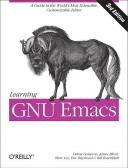Книга: Learning GNU Emacs, 3rd Edition
14.5.1 Customizing Completion
14.5.1 Customizing Completion
If you have read Chapter 10 and are comfortable with setting Emacs variables, you should know that a few variables can customize the way Emacs does completion. The variable completion-auto-help determines whether a *Completions* window automatically appears when you try to use Space or Tab on an ambiguous prefix. Its default is t, meaning that such windows automatically appear. If you set it to nil, instead of a *Completions* window appearing, Emacs just displays the message [Next char not unique] for a couple of seconds in the minibuffer.
If you are a programmer or if you use text formatters like LATEX , you will create files that are not meant for humans to read, such as object files created by compilers and print files created by text formatters. Ideally, you wouldn't want Emacs to bother with these files when you are doing completion; for example, if you have the files program.c and program.o (object-code output from the compiler), you want Emacs to recognize only the former. Emacs does have a feature that deals with this; indeed, you may already have noticed that in this kind of situation, if you type program and press Tab, Emacs ignores program.o and completes out to program.c. The variable completion-ignored-extensions controls this; it is a list of filename suffixes that Emacs ignores during filename completion. By default, the list includes tilde (~) for Emacs backup files, .o for programmers, various suffixes for users, .elc (byte-compiled Emacs Lisp) for Emacs customizers, and others. (Of course, if you really want to look at these files, you can type their names manually.)
You can add your own "ignored" suffix to the list by putting a line of this form in your .emacs file:
(setq completion-ignored-extensions
(cons "suffix" completion-ignored-extensions))
For example, let's say you are doing text processing with a printer that prints PostScript, and your text processor produces print files with the suffix .ps. If you don't want to look at these files, put the following line in your .emacs file:
(setq completion-ignored-extensions
(cons ".ps" completion-ignored-extensions))
Finally, you can tell Emacs to ignore case distinctions when doing completion by setting the variable completion-ignore-case to t (or any value other than nil). Its default value is nil, meaning that Emacs respects case distinctions.
- 16.2.2. Customizing Kernel Initialization
- 10.3.3 Customizing Fonts Through Custom
- 5.5.1 Run-to-Completion Tasks
- Chapter 10. Customizing Emacs
- Chapter 5 Customizing a Board Support Package
- Customizing Default Tests
- 12.9 Customizing VC
- Lesson 1: Creating and Customizing the Operating System Design
- 8.3.2.5 Using completion
- 9.3.2 Customizing Code Indentation Style
- 10.1.3 Customizing with Custom
- 10.4 Customizing Your Key Bindings




